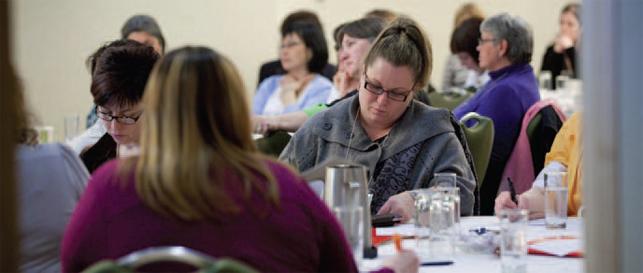
Women In Politics Do Make a Difference (Professional Services)
"Canada is one of the best countries in the world when it comes to standard of living and qualityof life – we always rank in the top ten or so countries according to the United Nations. But when it comes to female representation in politics we do very poorly. Our ranking is alwaysaround 50th in the world1; that means that all these other countries do better than we do. It’s a disgrace for such a great country as Canada!” —Donna Dasko.
Donna Dasko is uniquely positioned to talk about women and politics. She is the senior vice-president of public affairs at the Environics Research Group, one of Canada’s best known and most highly respected public opinion research firms. She is also the national chair of Equal Voice, an organization dedicated to getting more women elected to public office in Canada.Offering political training is one of the many ways ETFO supports members. Donna was a keynote speaker at ETFO’s recent Women in Politics Conference; she has spoken often at ETFO events. I spokewith her about women and politics.
MM: Why would we even talk about women and politics as though it were something different from politics in general?
We talk about women in politics, in business, in the professions, in unions, and so on, because we know that women do not have the influence, the voice, or the power that men do in any of these spheres of life. So we have to make that clear, and that is why we pursue it and talk about it. And we do see differences in interests and issues as well.
MM: What is the position of women in Canada politically?
Women, of course, form a large and significantpercentage of the population – over half! Womenvote in numbers equal to men. Women have more influence than they usedto in the past, I am con vi need of that. There was a time that we could not vote or be elected or hold positions of influence. Today, individual women may have influence and power, but it is far from what it should be.We rank 50th in the world in terms of the percentage of women holding elected office —behind the Scandinavian countries, and Afghanistan, Rwanda, South Africa, Iraq, Spain, Portugal, Mexico, Mozambique, Costa Rica, among others.
MM: Why do you think this is the case?
It's not a difference of views and beliefs; Canadians are not more sexist than many of the countries that do better than we do. But many of those countries have different electoral systems that promote more women, either through proportional representation, legislated seats for women, or some other form of recognition. That would be the main difference and main explanation.
MM: Would it makes difference to have more women hol holding office? Do women make different policial decisoins than men?
Here are the differences that I have found in my research and reading.
- First, women tend to lead with different styles than men; women are more consensual.
- Second, there is usually a gender gap in federal politics especially, in the parties that women and men vote for. Women are less likely to vote Conservative and men are more likely to do so; women are more likely than men to vote Liberal and New Democrat.
- Third, there is a gender gap in the issues and concerns. Women are more supportive of spending on health care, education, and social programs than men; men are more interested in the economy and its related issues. Women are generally opposed to military ventures, going to war, and related initiatives; men are more supportive. Women tend to cluster around the middle of the ideological spectrum; men are more likely to be right-of-centre and further left-of-centre.
- Fourth, in some of my polling research I have found that men are more attracted to leadership images when they vote for a party, while women may be making their political decisions more on the basis of the policy directions of parties. I have not done enough research to verify this beyond a doubt but I find it quite intriguing to think about, especially since some folksthink that women voters are attracted to strongmen when in fact it may be men who are!
However I must stress that these are tendencies and not absolutes by any means. There are individual women, and in some cases substantial minorities of women, who may hold different views from a majority of women. There are regional, age and socio-economic differences among women that may affect their views. I always keep this in mind because we cannot assume that women hold the same views. We know this just by thinking about the women we know!
MM: And what about different candidates? Are women more likely to vote for other women?
We have certainly asked about this in our polling. Yes, women are more likely to vote for women than men are, but most significantly, the vast majority of all voters, men and women, are quite willing to vote for women. Why? Because people at the federal or provincial level are voting generally for a political party, and if the party they like has a female candidate, they will vote for her. It's that simple. So if the political parties nominated more women in their winnable ridings, we would have more women in the House of Commons.
MM: If you were advising a woman about running for office, what would you say to her?
Well there many things that office seekers do. Follow the issues of interest to you. Get involved in your community and your profession. Get to know people. Get involved. One thing I learned recently from some U.S. research is that women tend to undervalue their credentials to run, while men with similar credentials tend to think that they are well qualified! Isn't that interesting? So do not short-change or your view of yourself.That means you have to go for it!
Notes
1 Canada is 43th according to the InterparliamentaryUnion data; available atwww.ipu.orgjwmn-ejworld.htm

